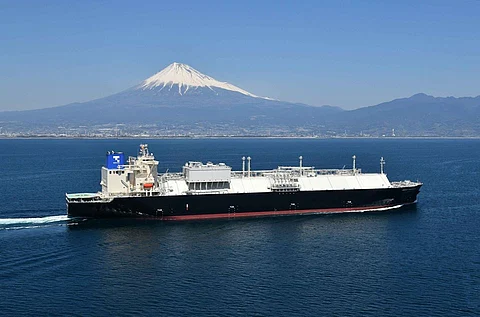

The success of Alberta’s efforts to secure Japanese buyers for the massive LNG Canada project at Kitimat became clearer on Monday after the US announced it was still trying to woo reticient Japanese and Korean buyers for a proposed terminal in Alaska, despite the threat of punishing trade tariffs.
While Alaska officials scramble to court Japanese investors for their USD$44-billion LNG project, Alberta has already sealed a major energy agreement with Japan — exposing a stark contrast in North American energy diplomacy.
That’s because US president Donald Trump is using the threat of tariffs as a big stick to bludgeon Asian ‘allies’ to buying American gas.
But Alberta Premier Danielle Smith beat him to the punch at the CERAWeek by S&P Global energy conference in Houston last week — using charm and a strong business case for Alberta gas as her secret weapon.
Smith and Japan Organization for Metals and Energy Security (JOGMEC) CEO Ichiro Takahara signed a memorandum of understanding (MOU) at the conference, reaffirming Japan’s commitment to Alberta’s oil, natural gas, hydrogen and ammonia industries.
“JOGMEC has been one of our province’s most significant and long-standing partners in Asia,” Smith said, highlighting that Alberta is actively attracting foreign investment while Ottawa drags its feet on LNG development.
JOGMEC is Japan’s largest LNG buyer, acting to secure overseas energy on behalf of its government. With few energy resources of its own, Japan relies heavily on imports of both oil and natural gas to power its economy, the third-largest in the world.
The deal includes collaboration on carbon capture, storage,and other emissions-reduction technologies, further cementing Alberta’s role as a preferred energy partner.
Trump’s push for Alaskan LNG comes as the massive LNG Canada project — backed by Shell, Petronas, Mitsubishi, and others — prepares to ship first exports from Kitimat later this year.
The Canadian project, with its shorter shipping distance to Asia and stable investment environment, poses a direct challenge to Trump’s vision of Alaska as a dominant LNG hub. It’s the largest private sector investment in Canadian history at $40 billion.
Though Canada is late to the LNG party, industry analysts warn that Trump’s tariff threats and aggressive pressure campaign could backfire, driving Asian buyers toward more reliable suppliers like Canada.
If Japan ultimately decides that Kitimat is the better option, Trump’s ‘Alaska First’ LNG strategy may be dead before it even starts, contrasting sharply with Smith‘s soft power approach.
Meanwhile, Trump is using the threat of trade tariffs as a blunt instrument to pressure Japan and South Korea into committing to US LNG and setting Alaska up as a competitor to Canada, which already faces the prospect of 10% tariffs on energy after April 2.
Trump has made it clear he intends to reverse Biden-era restrictions on LNG exports and put Alaska LNG at the center of his energy policy. In the Gulf Coast, the US has skyrocketed from virtually zero LNG exports a decade ago to becoming the world’s largest LNG supplier, and Trump is determined to expand that dominance even more.
“Japan and South Korea want to partner on Alaskan LNG,” Trump declared in a recent speech, framing the project as a key pillar of US trade policy.
Despite this, Japanese energy firms remain skeptical. Costs associated with operating in Alaska’s harsh climate, the massive pipeline infrastructure required, and questions over long-term feasibility have made Japan hesitant to formally commit to Trump’s threats, while JOGMEC has refrained from endorsing the project.
The Alberta agreement underscores Japan’s reliance on Alberta’s energy sector, despite Prime Minister Justin Trudeau’s infamous assertion that “there is no business case” for Canada to ship LNG to Germany.
Japan was Alberta’s third-largest export market in 2024, with energy exports alone reaching nearly USD$1 billion.
